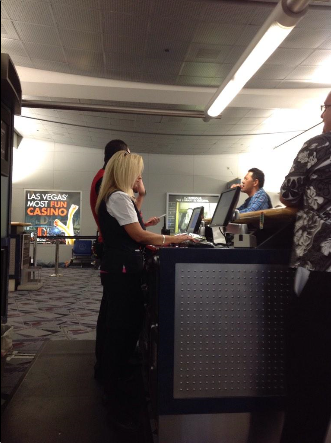You know that you need to pay the Mafia for protection or bad things will happen. Did you know that you need to pay your airline too? In airline industry parlance, “protection” means guaranteeing you transportation to your final destination. It seems like a fairly simple thing–after all, you paid for a ticket–but it’s remarkably easy to find yourself in a situation where you get stranded in a random airport somewhere along the way and nobody will do anything to help you.
I first learned about “protection” when, several years ago, Delta protected me through to Athens on an itinerary that they would have broken through a mechanical delay in New York. They also fixed my ticket on the return. What happened? I bought a Delta ticket to Frankfurt, and a separate ticket onward from Frankfurt to Athens. Delta’s delay would have resulted in me missing my flight in Athens. Since the delay was Delta’s fault, they did the right thing and instead transferred me onto their nonstop Athens flight. Additionally, since my onward ticket was invalidated by my failure to show up for the first leg, Delta also re-booked me on their nonstop flight for the return. I actually ended up with a much better itinerary as a result, and I was really happy that Delta didn’t dump me in Frankfurt hours late, and left to fend for myself.
Fast foward to tonight. I’m waiting for a delayed Delta flight, and have been sitting near the ticket counter. So, I’ve been able to overhear all of the activity. Delta routinely rebooked a few people with connecting flights they’d miss, denied meal vouchers and a hotel to someone who wanted to extend his stay (reasonably so, it was only a 2 hour delay), more or less the usual. Except for the guy above. This guy booked his flight through a travel agency. It was booked as two round-trip flights with two separate ticket numbers:
- Taipei-Los Angeles-Taipei
- Los Angeles-Las Vegas-Los Angeles
The tickets were consolidated into a single itinerary and Delta has a baggage agreement with the connecting carrier (All Nippon Airways) so the guy probably had no idea that he had a completely unprotected itinerary. After all, when he checked in, his bags were tagged all the way to their final destination. The only thing he knew he would need to do was get boarding passes for his connecting flight from the connecting airline, but this isn’t even particularly unusual in Asia. Most airports there have a transfer desk for precisely this reason.
So, all of this works just fine… until it doesn’t. The flight I’m on is delayed 2 hours. What was plenty of time for a connecting flight has turned into just 15 minutes. There is no physical way to make the transfer from Terminal 5 in Los Angeles to the Tom Bradley Terminal, short of someone meeting the incoming flight at the gate in a Porsche. And even then, making the connection would be a race. “This is not our ticket to Taipei, there is nothing I can do,” the Delta agent kept repeating to the visitor (a Japanese man who apparently lives in Taiwan). “Your ticket with us is only to LA. I can only get you to LA. You will have to deal with the other airline when you get there.”
Obviously, being a no-show for an international flight, without even having a boarding pass issued, is disastrously expensive. And one might think it’s not entirely reasonable for Delta to completely wash its hands of the problem, given that the flight delay was totally their fault. The flight crew called in sick! They had to find another flight crew. Incredulous, the Japanese visitor–who had every right to expect Delta to solve the problem–politely asked again for Delta to help. He was again rebuffed. This happened a few more times, which is a really big deal in Japanese culture, and finally it became clear: Delta was, in fact, going to just dump him in Los Angeles with no solution, left to solve a problem that they alone created. He wasn’t getting home.
When I contrast this to my experience in Japan with a tight connection that was entirely my fault, and how JAL and ANA completely had my back and did everything possible to help me make my flight, it’s truly unbelievable. But that’s the current state of air travel. These days, at least with Delta, your itinerary is only protected if it’s all on a Delta ticket number. It’s not even entirely clear whether it’s possible if there are multiple Delta ticket numbers. If anything goes wrong along the way–even if it’s entirely their fault–you could be left stranded in a strange city and forced to fend for yourself.
How can you prevent this sort of problem from happening? For the average consumer, it’s almost hopeless, actually. Travel insurance is often suggested as the catch-all panacea, but most travel insurance won’t cover you in this situation. When you book online, some sites (such as Kayak) will automatically string together itineraries such as these in order to secure the lowest fare. The safest way to at least have a fighting chance is to buy your tickets directly from the airline (either by phone or on their Web site), and to buy simple roundtrip itineraries. Obviously, this isn’t always possible, particularly with complex international itineraries, but if you bought everything directly from the airline you’re flying, you’ll at least have a better chance of success.
I am fond of saying that the only thing an airline’s Contract of Carriage actually requires them to do is to eventually transport you to your final destination. However, the definition of “final destination” can now be fuzzy. You and the airline may not actually think it is the same thing. Buyer beware!

